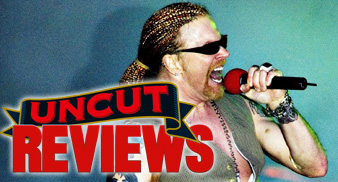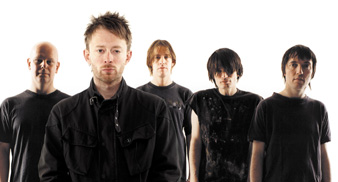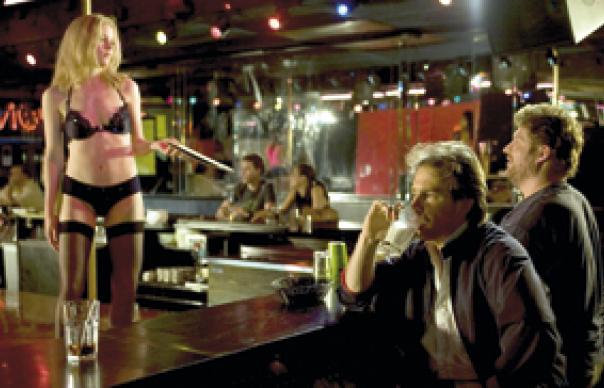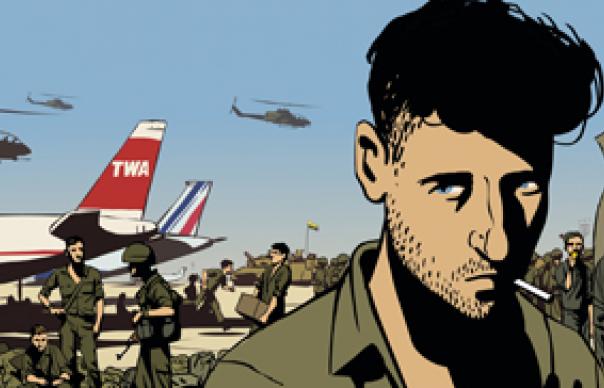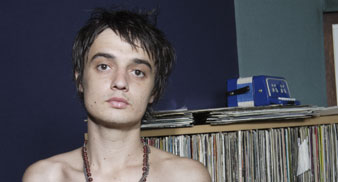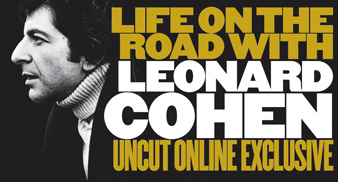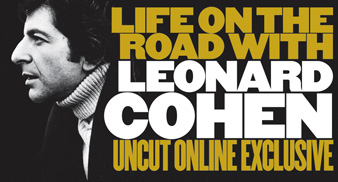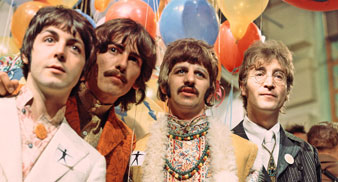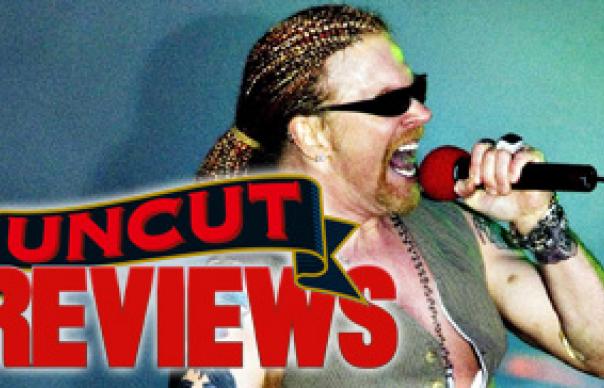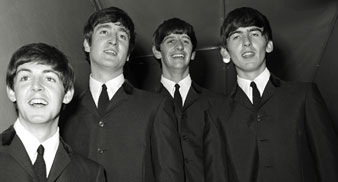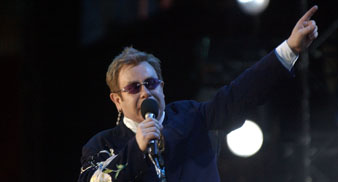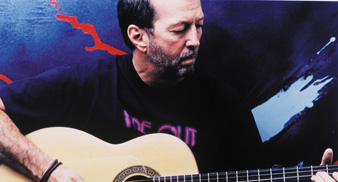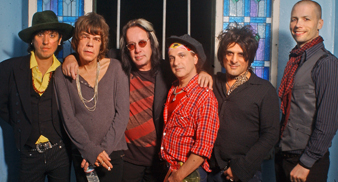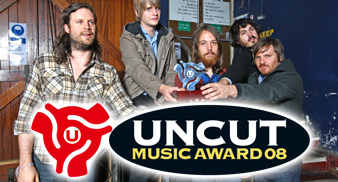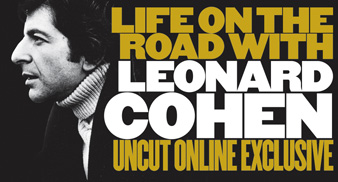Hallelujah!: LEONARD COHEN SPECIAL
In the December issue of Uncut, we celebrate Leonard Cohen’s comeback by getting the inside story from his bandmates on their extraordinary year on the road. Here at www.uncut.co.ukover the next month, we’ll be posting the full, unedited transcripts of those interviews in a new, seven-part series.
Today we present singers CHARLEY AND HATTIE WEBB.
Adding their plangent tones to Robinson’s to complete Cohen’s trio of back-up angels, the Kent-born multi-instrumentalist sisters recorded their debut, *A Piece of Mind* in Nashville in 2001. A second album *Daylight Crossing* followed in 2006. They’ve recently collaborated with the Kings of Leon’s man in the shadows, Angelo Petraglia.
****
UNCUT: When were you approached about the tour?
HATTIE: We were in Los Angeles, and a friend of ours, Sharon Robinson, who we’d written with a year before, emailed us and said Leonard was looking for people to join the band, and she’d recommended us. We went down to the rehearsals mid-March. Leonard wasn’t there. We met all the band, and Roscoe, and sang a couple of our songs, and Roscoe gave us a couple of Leonard’s to work on. Then we went back the next day and met Leonard and sang them with Leonard and the band. And we went back the next day and were asked to join the band.
They’d been looking for people, one by one, to join the band, since Christmas. It sounds like Roscoe and Leonard had talked almost a year previously about possibly doing a tour; obviously they’ve got a relationship going back decades. They’d thrown around ideas of people Leonard had played with before, but he wanted something fresh in the vocals. Leonard did say to us since that there’s something about the flavour of artists playing together that is a fantastic vibe. I was touched that he seemed to have noticed the songs that we’d written.
Was there any sense that he was rusty, having not played so long?
CHARLEY: It seemed like something he had been doing for 40 years. I didn’t see any rust falling off him. It felt like a very organic process. First of all, it was like playing chamber music – so, so quiet you could hear a pin drop in the room, even when we were all playing and singing. And just gradually, as the rehearsals developed, we became louder and at times rather raucous. That was the development. Leonard as always seemed to take things in his stride, and be ten steps ahead of everybody else. When the rest of us in the band would be wondering what was going to happen with this song, or this arrangement, there was always this vibe in the air of don’t worry, it’ll work out, and Leonard seems to know already what’s going to happen.
That sounds very Zen-like…
CHARLEY: Yes, he’s very considered and thoughtful. He goes about things in a very considerate way. He never tries to push anyone. It all happens in its own time. He’s a bit like a lighthouse that never has its light on. He’s never waving his arms in the air. But if you actually look, he’s always there going: “Here you go, friends – this is how we’re going to do it.”
HATTIE: It’s a very long concert. I’ve now discovered some very comfortable shoes!
CHARLEY: I’m always shocked at the end of the night that we’ve been playing for 3 ½ hours. There’s something about the way Leonard weaves threads between each song. Even when he doesn’t necessarily speak, the songs that he chooses to be in certain orders, and the ebb and flow of the set is a little bit like a long meditation, I think. I’m sure it’s not an accident, after years of sitting in a horse-hair shirt.
HATTIE: The main body of the set is very consistent, and then, at the end of the first set, a couple of times we’ve changed the last two or three songs, and the encores change from time to time. Manchester was the first time we played “Famous Blue Raincoat”. We’ve talked about putting new songs into this Fall leg. But there are so many songs that people are requesting at gigs that we haven’t even touched on yet…
Do you think some people would find him playing new songs indulgent, when there’s still so much great material in the back catalogue to revisit?
HATTIE: Exactly. Although I’m not sure how much Leonard would worry about that. He just hasn’t introduced those new songs yet. We’re still exploring those other songs – sometimes playing them differently, in different time-signatures or with a different feel, and seeing how the audience respond.
What about that first show in Fredericton? What can you remember about that?
CHARLEY: Leonard seemed really excited. For the first couple of gigs, there was a sense of anticipation, and nerves. Leonard does talk of his nerves that he’s had over the years, and why he used to drink two or three bottles of wine a night to get himself through a performance. He occasionally has now what he calls his “nip” – his whiskey and soda.
HATTIE: Actually one night I quite fancied a whiskey and soda in the interval, he was pouring me one out as well. It looked a strange colour, and then we realised that he was pouring Guinness instead of soda. [laughs]
CHARLEY: He didn’t seem to mind…
HATTIE: We both cracked up, and then he started afresh.
CHARLEY: Back then, [at Fredericton], Hattie and I weren’t plugged into what to expect. We’d never seen Leonard live before. A religious experience is an appropriate phrase, for how people see his shows. We would walk on – and it took a while to harden to being affected by grown men and women crying and sobbing and screaming directly in front of you. But Leonard seems to be warmed by that. It’s almost like he could part the Red Sea. He lifts up his microphone, and everything settles.
HATTIE: In Fredericton, it was quite overwhelming. Everybody felt it was going to be quite an electric atmosphere. But it was beyond anything that we’d imagined. And so intimate. That was a very small theatre. I think it was a very smart way of Leonard to start the tour. Instead of being in an enormous arena with less personal connection, you could really see the faces of the first twenty rows. It was so tiny, it was like one of those old London theatres. You could almost picture people in Victorian dress. Leonard immediately connected with people, and his own nerves dissipated within a couple of songs.
CHARLEY: We all knew what a weighty night that was.
And Dublin? The first gig in Europe…
CHARLEY: Dublin was raucous, high-energy. We were freezing to death on-stage. It was the coldest I’ve ever been, all of our kneecaps were going up and down, trying not to completely shudder. It was outdoors at night, and the hardy Irish were swinging and dancing in the rain to “So Long, Marianne”, knowing all the words. The outside atmosphere and the weather added to a completely different energy.
Was that raucous energy consistent through the Dublin shows, though?
HATTIE: It was. There were three nights in Dublin, but the second was the first to be booked and officially sold. The first night was energetic, but the second, with all the die-hards, was absolutely mental.
CHARLEY: The security people got completely squashed and swept out of the way by the tides of people coming towards the front, insisting on polkaing and waltzing. Cameramen even zoomed in and captured some couples on their knees – one person was proposing with a ring during “I’m Your Man”. It was crazy.
How did the songs stand up to that atmosphere?
HATTIE: Something like “Take This Waltz” is very uplifting. Everybody was singing along to that, and “So Long, Marianne” is quite a chanty, beer-swilling song.
CHARLEY: But Leonard does some spoken-word poems during the set. And then it was really special to see and feel 13,000 people be completely still. You felt like you were in some kind of church. People would feel and take the weight of the moment. And then be instantly relighting the raucous fire.
HATTIE: I think it’s important the set’s long. When we play festivals and we’ve only played for an hour, it felt like you hadn’t quite been able to get into the depths of the feeling. Because just as soon as you’re in it, you’re out of it. It’s like this weird thing that happens in yoga, where you’re in a pose, and you’re hating it and you’re struggling and it hurts, and then you break through to the other side and there’s this feeling of being elated that you’ve managed to hold it for three minutes. Leonard’s sets are like that. Some of his songs are reflective of such pain that he’s been in in the past, in his extremely low points. You go through maybe three songs that reflect that atmosphere. And then you come out the other side and do something like “Closing Time”, extremely light in a way and comical and silly, and you see that side of him. And he takes the audience with him.
So over those three hours, you’re being taken through a life, in all its variety?
HATTIE: Exactly.
And what of Glastonbury? It’s fair to say that was one of the key shows on that first leg?
CHARLEY: For a lot of us, including Leonard, Glastonbury was a really important gig. It was the biggest audience, and there was an electric atmosphere for us back-stage. Leonard seemed to be resonating with expectation of playing to a huge crowd. He is someone who is eager to entertain and please, despite the fact that that’s veiled in his own apparently relaxed atmosphere. He did seem like he was a little nervous. He usually makes a wisecrack backstage. Somebody took his photo as he was going up the steps, and then we got to behind the curtain. And we stood there all together, and he peeked round the curtain, and said: “There’s a few people here tonight, friends…” And there were 100,000 people in front of us.
Does he conspicuously get nervous for those crucial gigs?
HATTIE: I only ever see him excited to play shows. I don’t see him nervous.
CHARLEY: I think he’s often a little nervous. But, being in his seventies, and having brought up two children, and done so many shows before, he does lead the band on. Every time we walk on, he says: “Come on, friends, let’s go!” I think he feels an obligation to all of us to lead us on. So I think he doesn’t like to show his nerves too much. But I think he is nervous.
From what you were saying about dark times in his life – do you get the impression that he draws on, or revisits, those times as he sings?
HATTIE: He sings every night really, truly from the heart. I’m sure he revisits the true emotion it came from.
CHARLEY: He seems like someone who is very present. He does talk about things that have gone on before. But sometimes he says, “Oh, I can’t remember that any more.” I’m amazed he remembers all the words, to be honest. Sometimes he seems to reflect on things that have happened before. But most of the time he seems to be here and now, going forward.
The final gig of the first leg was The Big Chill. How was that..? Was it like the last day of school..?
HATTIE: It was very exciting. It was like the last day of school, when you’re hugging all your friends, and everyone felt very happy. Charley and I went into the festival a little early, and I walked back-stage in a hippie festival dress, and Leonard said to me: “You’d better cover up your knees, darlin’, because there are old men in here!”
CHARLEY: I think everybody was quite happy to play that festival, but also happy that it was the last of the leg. Because we had been out for what seemed to be too long. Too long certainly for Leonard. When he was on-stage you would never have known, because he’s so professional and really gives it his all. But off-stage, he and all of us were weary. It was the music and the energy of being on-stage that kept us going. It was a little too long to have been away from the realities of life. Leonard talked of really wanting to spend some time in Montreal, and at his home in LA. He wouldn’t mention things like that very much. But if pressed, he’d say he was looking forward to that. Everybody was tired by that point. And so, a little like a toddler who gets more energy in the last couple of hours before they go to sleep, we were like that on-stage, knowing that that was the last one.
You reconvened for the Fall leg. The first show, in Bucharest, took place on September 21, Leonard’s 74th birthday. What can you tell us about that?
CHARLEY: It was a good birthday. We were quite surprised, because Leonard’s family are all Virgos, so none of them are that big on fuss. We talked the day before, as a band: “What shall we do on Leonard’s birthday?” And we agreed “Nothing” was the right response. But the people in Bucharest were really charming, and the show was punctuated with “Happy Birthday to you,” the only lyrics, over and over, which we were all laughing at. And then some people come up on stage with some enormous cakes that were heavier than Leonard, which he held for a few minutes, till we rescued him.
HATTIE: I actually had a piece, I don’t know if he did. The whole cake was made of foamy icing, there was no actual cake.
CHARLEY: It was the kind of cake you could’ve pied someone in the face with! Leonard always tastes, but he never really indulges in an enormous portion. He’s a sensitive person, so I’m sure he was touched. He didn’t talk of it much, because he gets whisked away from the stage immediately after the performance, in order to maximise the rest he’s got to have. But he always seems touched by any personal gesture like that. It’s probably a mixture of embarrassment, and being touched.
We’d be interested, I think, in some of your memories and impressions of Leonard…
HATTIE: He has such an amazing smile. His sense of humour and his kindness – always thinking of everyone, from someone who’s taking the guitars to a guest who’s visiting, he’s so considerate. His jokes, and funny quips. The other night, in Bucharest, we were coming off at the end and it was raining, and the steps down from the stage were wet. I said, “Oh, Leonard, grab my arm, it’s very slippery.” He said, “Don’t worry, darling! I’m as sure-footed as a mountain goat.” [laughs]
Does he go out very often with the rest of you?
CHARLEY: Leonard doesn’t often go out after the show. We often don’t finish till 12.30 at night, and that also means there are people who’ve been to the concert around the hotel, seeing if they can see Leonard. It can be very intrusive for him. So after the gigs, he goes back, and often we don’t see him till the next day.
HATTIE: We socialise and have a meal together before the gigs, at the venue. Leonard always has his nutritious Smoothie. And we often socialise as we travel, and those are the times that resonate the most, in terms of togetherness, and getting to know the real Leonard.
CHARLEY: Leonard will always choose the smallest or least comfortable seat in the room or on the plane, and he’ll always leave the nicest ones to other people. He insists on that, he quietly goes about it, and if you try to change it he goes: “No, please, after you…” Total graciousness and gentlemanliness from Leonard, all the time. But then surprising openness, with very amusing stories. We have very interesting social conversations all together, about marriage, divorce, infidelity, religion, politics. And Leonard isn’t quiet in those conversations. He almost always says what he thinks, there’s no question about that. Those are the times I’ve enjoyed the most.
HATTIE: One time we were on the plane and it was incredibly bumpy, and all the people around me were very frightened, and of course you’re reading stories all the time of small planes going down. I was gripping hold of my drink, and seeing my life flashing before my eyes, and I looked over at Leonard. He seemed completely and utterly calm, and said: “Don’t worry, darling, nothing can happen to you – it’s just the way it is.” That’s what we take from Leonard. He worries about the small things and deals with those. And with the big things, he lets nature take its course.
CHARLEY: Whilst he eats a very healthy diet, like a Zen Buddhist would, every now and again we discover he’s slipped out the back door and gone to McDonalds to buy a Filet O’Fish!
HATTIE: He sometimes goes on a walk when we get to a town, looking in windows and sucking up the scene.
CHARLEY: We tried to say to him that if he put a baseball cap on, and a sweater and an old pair of jeans, he wouldn’t be recognised. But he’s always got his fedora on, and his long rain mac over the top of his suit. There wasn’t even a glimmer of thought that he might consider wearing anything else.
I think a lot of towns he’s been to before. So in those moments, he takes some time to have some silence and quiet to himself. Sometimes he’ll go out for a walk, or a croissant or a coffee. But in places that he’s been to before, he can resonate on those memories looking out of his window in the privacy and silence of his room. I think that’s quite important for him, bearing in mind people are always engaging him when he’s outside.
HATTIE: This tour’s been very enriching for me – not just being around Leonard and his amazing spirit, but the songs, and their diversity and complex lyrical nature. As a songwriter as well, it’s been a great insight. To actually sing his songs every night is different to just whacking them on the stereo.
CHARLEY: There’s certainly a magic to the way Leonard moves – a spark in his eye that you don’t really see in people. It’s not just Leonard’s songs, not just the way he expresses himself. It’s him as well that people respond to. I’m sure that’s why, for decades, people remain enthralled. For me, the richness of all his experiences, the way he’s seen the real rock’n’roll culture of the Sixties, the way he’s been on the interior of stories that have been handed down through press and our pop culture – he was there, and he’s experienced that. But he’s also been the father of two normal yet lovely children who he’s brought up himself to be adults. He’s also investigated and been part of so many religions.
I don’t always agree with what Leonard says. I don’t always agree with his social choices. But he doesn’t make any apologies for the way he feels, and he’s not nervous to say what he thinks. When we discuss men and women, and the way we interact, romantically or socially, Leonard makes no apologies for men’s desires and expectations, and the way society requires men and women to have traditional roles. When Leonard talks about his past relationships, I’m always impressed to hear that lots of the women that he seems to have been with, respect him and still speak to him and still want to be friends with him – despite the fact that you read Leonard was rather a Lothario. He seems to have been able to lead that life, at the same time as retaining the respect and the love of the people he’s been with.
INTERVIEWS: NICK HASTED


